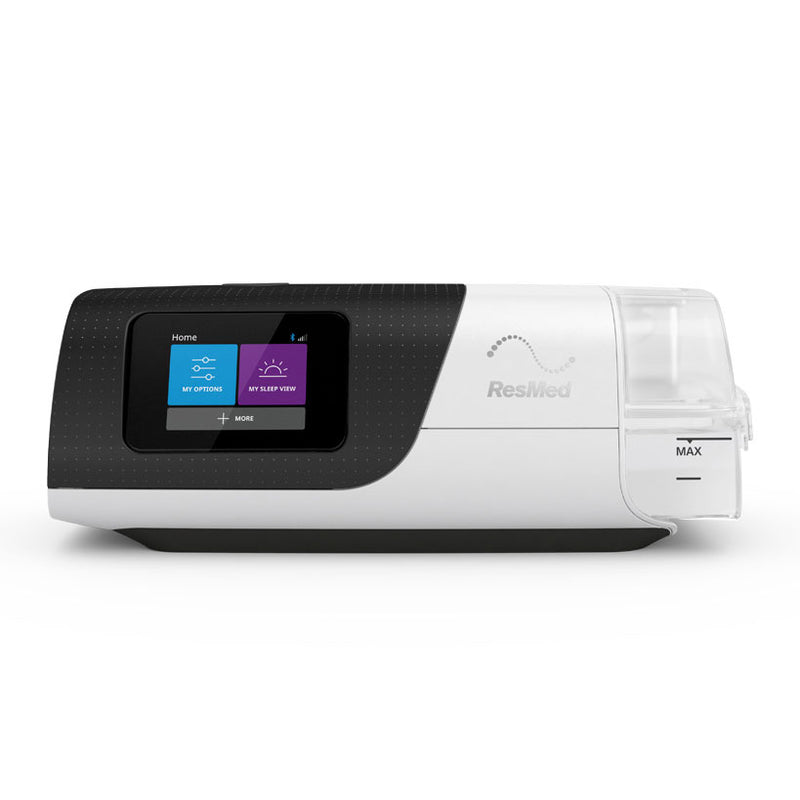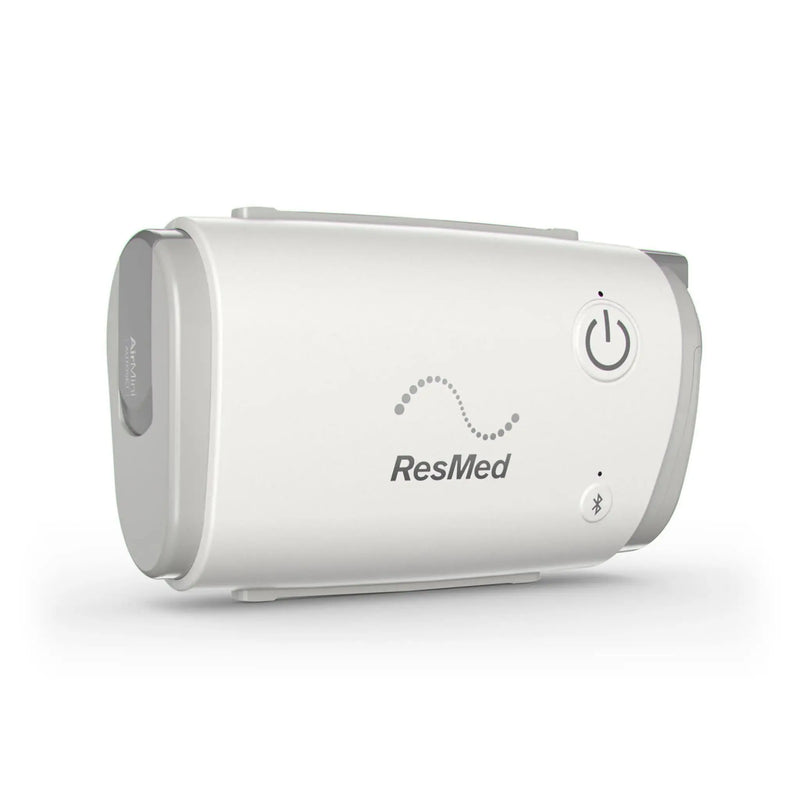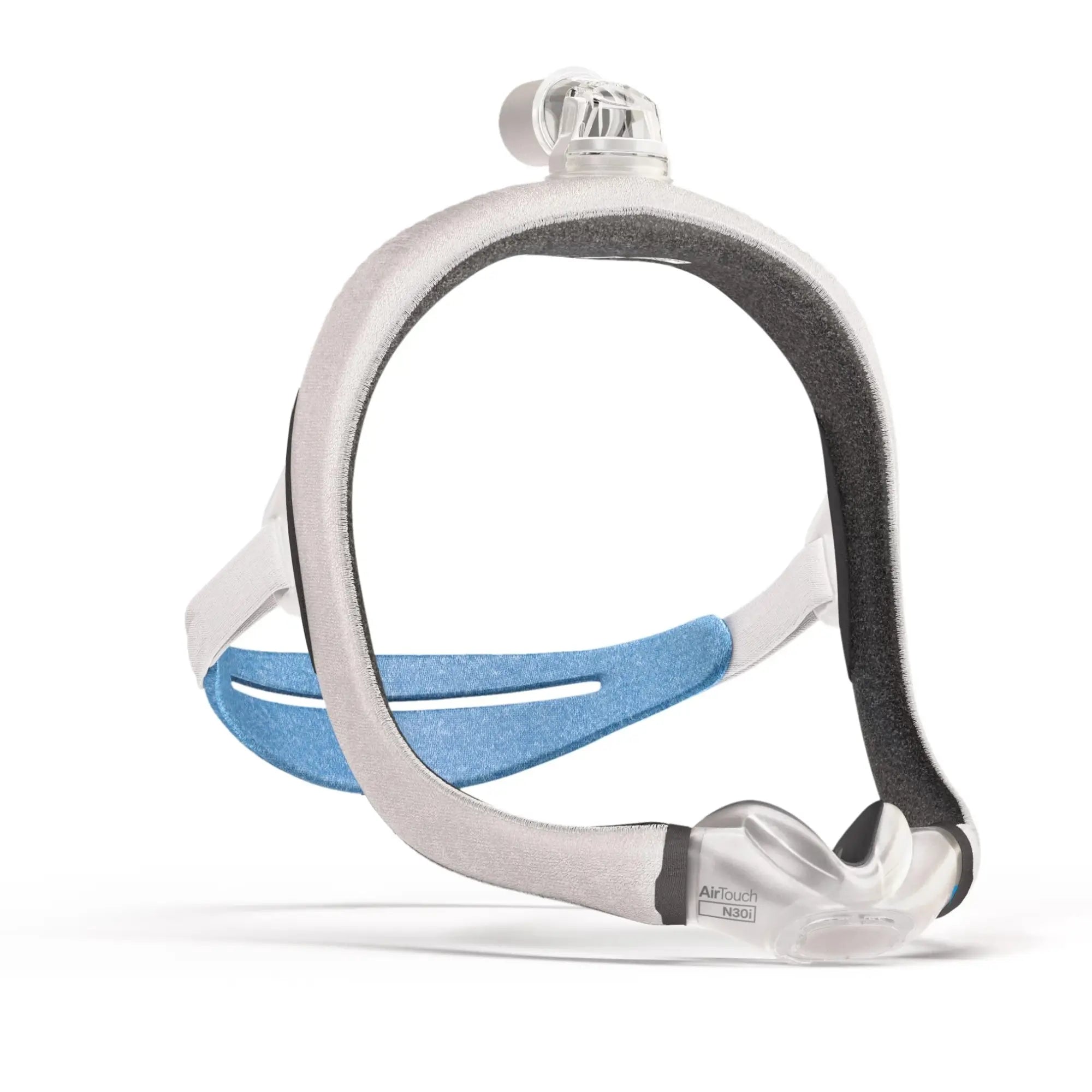Click here to download your free PDF: CPAP Machine Buying Guide
If you keep waking up feeling tired and groggy, even after a full night's sleep, you might be suffering from obstructive sleep apnea (OSA).
OSA is a condition where your airways become blocked during sleep, causing you to snore loudly and stop breathing for brief periods. This can disrupt your sleep and leave you feeling exhausted throughout the day.
Fortunately, there's a solution: CPAP therapy. A Continuous Positive Airway Pressure (CPAP) machine gently blows air into your lungs, keeping your airways open and ensuring uninterrupted breathing. This simple yet effective treatment can significantly improve your sleep quality and overall well-being.
In this guide, we'll walk you through the process of choosing the right CPAP machine to suit your needs and start breathing easier every night.
Do You Need a Prescription For a CPAP Machine?
Yes, you need a prescription to purchase a CPAP machine since they are medical devices, and a doctor needs to determine the appropriate pressure settings to effectively treat your obstructive sleep apnea (OSA). Without a prescription, you risk getting a machine that doesn't work properly, which could lead to more serious health problems.
A prescription isn't just a formality. It's a medical necessity that ensures you're getting the right treatment.
OSA varies in severity, and only a professional can set the right therapy plan. If you haven't undergone a formal sleep study yet, you might be wondering how to get a prescription.
That’s where a home sleep test comes into the picture. This convenient option allows you to take a sleep study in the comfort of your own home. Here's how it works:
- Schedule a consultation with a doctor.
- Receive the sleep test at home.
- Take the test overnight in your own bed.
- Receive your diagnosis and prescription based on the results.
Meanwhile, it's important to note that while Apple Watches can detect symptoms of sleep apnea, they aren't official study tests.
If your Apple Watch has been indicating signs of sleep apnea, we recommend checking out our blog post, "What to do if my Apple Watch detects sleep apnea?" for more information.
Now that you understand the importance of a CPAP machine prescription, let's dive into the different types available.
1. APAP (Auto-Adjusting CPAP)
APAP machines automatically adjust the air pressure throughout the night based on your unique needs. Think of them as personalized therapy, adapting to your breathing patterns in real-time.
Who is it for? People with varying levels of apnea or those who experience different severity levels at different points during the night.
Benefits:
- Personalized therapy: APAP machines offer tailored treatment.
- Comfort: No static pressure all night, ensuring a more comfortable experience.
2. Non-Adjusting CPAP
Non-Adjusting CPAP machines deliver a consistent pressure based on your prescribed settings.
Who is it for? Ideal for users with a specific pressure setting and consistent therapy needs.
Benefits:
- Simplicity: A straightforward option for those with stable pressure needs.
- Reliability: Consistent performance throughout the night.
3. BiPAP (Bi-Level Positive Airway Pressure)
BiPAP machines provide two levels of pressure: higher when inhaling and lower when exhaling.
Who is it for? BiPAP is recommended for users with more severe or complex sleep apnea, those with certain respiratory conditions (COPD), or patients who require higher pressure settings that can make exhaling difficult.
Benefits:
- Comfort during exhalation: BiPAP machines make breathing easier.
- Tailored therapy: Ideal for those who need a more customized approach.
4. Travel CPAP
Travel CPAP machines are your go-to companions for on-the-road therapy. They're designed to be compact and lightweight, making them perfect for frequent travelers.
Who is it for? Ideal for people who are often on the go or who need a second CPAP machine for travel.
Benefits:
- Portability: Easy to pack and take with you.
- Lightweight: Won't add much weight to your luggage.
- Travel-friendly features: Some models offer additional features for convenient travel.
Remember, our downloadable guide at the end of this blog provides a quick reference to these CPAP machine types for easy decision-making.
Key Features to Consider When Choosing a CPAP Machine
Before you purchase a CPAP machine, consider these key features, which can greatly affect your comfort, usability, and overall satisfaction with therapy.
1. Noise Level
A quieter machine means better sleep for both you and your partner. Look for machines with a noise level under 30 decibels, which are considered "whisper-quiet."
|
CPAP Machine |
Noise Level (Decibels) |
Comparable Sound |
|
ResMed AirSense 11 |
27 dB |
Whisper in a quiet room |
|
ResMed AirMini |
30 dB |
Quiet conversation |
|
Philips DreamStation 2 |
30 dB |
Quiet conversation |
2. Portability
If you travel frequently, portability is a must. Consider portable CPAP machines like the ResMed AirMini, which are designed for travel. Look for features like lightweight design, compact size, and FAA approval for in-flight use.
3. Cost
CPAP machines can range from $500 to $2,000. Basic CPAP machines are generally on the lower end, while advanced BiPAP or travel CPAPs can be more expensive. Consider financing options or insurance coverage to help offset costs.
4. Humidification
Humidification is key to preventing dry mouth, throat irritation, or nasal discomfort. Look for machines with integrated humidifiers, heated tubes, and adjustable humidity settings. This is especially important for users prone to dryness, those living in dry or cold environments, or users with sensitive airways.
5. Data & Connectivity
Modern CPAP machines offer data-tracking features that allow you and your healthcare provider to monitor your therapy progress. Look for machines with Bluetooth connectivity, app integration, and the ability to track apnea events, mask leaks, and therapy hours.
6. Warranty & Maintenance
A reliable warranty and easy maintenance options are essential for long-term machine performance. Look for warranties that cover at least two years, easy-to-access customer service, and clear maintenance guidelines.
Top CPAP Machines
Choosing the right CPAP machine can significantly impact your therapy experience. Here are the top choices we’ve selected based on features like travel, auto-adjusting, and BiPAP capabilities.
1. Best Auto-Adjusting CPAP: ResMed AirSense 11
 ResMed AirSense 11 AutoSet CPAP Machine
The AirSense 11 combines enhanced digital health technology with the latest sleep apnea algorithms that are designed to revolutionize CPAP treatment.
$1,004.00
ResMed AirSense 11 AutoSet CPAP Machine
The AirSense 11 combines enhanced digital health technology with the latest sleep apnea algorithms that are designed to revolutionize CPAP treatment.
$1,004.00

The ResMed AirSense 11 stands out for its auto-adjusting pressure, making it an ideal choice for users who need more personalized therapy throughout the night. It comes with integrated comfort features that simplify sleep apnea management for both new and experienced users.
Key Features:
- Auto-adjusting pressure for personalized therapy
- Includes a heated humidifier for added comfort
- Quiet operation (below 30 decibels)
- Bluetooth connectivity for data sharing with doctors
- Compatible with ResMed masks
|
Pros |
Cons |
|
User-friendly with easy setup |
Higher price compared to fixed-pressure machines |
|
Built-in heated humidifier for added comfort |
|
|
Quiet operation below 30 decibels |
|
|
Bluetooth connectivity for monitoring |
2. Best Non-Adjusting CPAP: ResMed AirSense 10
 ResMed AirSense 10 AutoSet CPAP Machine with HumidAir Heated Humidifier
The AirSense 10 is The quietest machine you'll ever use, keeping you and your partner happy.
$960.00
ResMed AirSense 10 AutoSet CPAP Machine with HumidAir Heated Humidifier
The AirSense 10 is The quietest machine you'll ever use, keeping you and your partner happy.
$960.00

The ResMed AirSense 10 is best suited for users who need consistent fixed-pressure therapy. Known for its simple operation and reliable performance, it's a trusted choice for experienced CPAP users looking for a no-fuss machine.
Key Features:
- Fixed pressure technology
- Simple user interface, ideal for experienced users
- Quiet operation for uninterrupted sleep
- Built-in humidifier for enhanced comfort
- Comes with smart connectivity options
|
Pros |
Cons |
|
Quiet operation below 30 decibels |
Less flexible; no automatic adjustments |
|
Durable and reliable |
|
|
Intuitive interface for experienced users |
|
|
Built-in humidifier |
3. Best BiPAP: ResMed AirCurve 11
 ResMed AirCurve 11 VAuto with HumidAir
The new ResMed AirCurve™ 11 VAuto bilevel device with a heated humidifier for patients with obstructive sleep apnea and those struggling with PAP therapy.
$1,796.00
ResMed AirCurve 11 VAuto with HumidAir
The new ResMed AirCurve™ 11 VAuto bilevel device with a heated humidifier for patients with obstructive sleep apnea and those struggling with PAP therapy.
$1,796.00

The ResMed AirCurve 11 offers tailored pressure support for users with complex therapy needs. Ideal for those who need different pressures for inhalation and exhalation, this machine is packed with comfort-enhancing features.
Key Features:
- Dual-pressure settings for inhalation and exhalation
- Ideal for users with higher-pressure needs
- Integrated humidifier
- Quiet motor operation (30 decibels)
- Bluetooth and cellular connectivity
|
Pros |
Cons |
|
Dual-pressure settings for tailored therapy |
Higher price than CPAP options |
|
Ideal for users with complex needs |
|
|
Integrated humidifier |
|
|
Quiet operation at 30 decibels |
4. Best Travel CPAP: ResMed AirMini
 ResMed AirMini AutoSet Travel CPAP Machine
The AirMini is the smallest portable CPAP in the market, but it still offers top quality therapy.
$919.00
ResMed AirMini AutoSet Travel CPAP Machine
The AirMini is the smallest portable CPAP in the market, but it still offers top quality therapy.
$919.00

The ResMed AirMini is an ultra-portable CPAP machine, perfect for frequent travelers. Its compact design and waterless humidification system make it easy to carry while maintaining consistent therapy.
Key Features:
- Compact, lightweight design (weighs just 0.66 lbs)
- Waterless humidification system
- FAA approved for in-flight use
- Auto-adjusting pressure and multiple therapy modes
- Compatible with ResMed CPAP masks
|
Pros |
Cons |
|
Lightweight and compact for travel |
Limited to ResMed mask compatibility |
|
FAA approved for in-flight use |
|
|
Waterless humidification |
|
|
Quiet at 30 decibels |
Accessories and Add-ons to Consider
While a CPAP machine is the core of your therapy, several accessories and add-ons can enhance your comfort and experience. Here’s a list of accessories you should consider:
- Prevent skin irritation or pressure marks.
- Helps minimize air leaks.
- Enhances mask seal, especially for users with sensitive skin.
- Ideal for camping, travel, or emergencies.
- Ensures uninterrupted therapy during power loss.
- Compatible with most portable and home-use CPAP models.
- Reduces mask displacement during sleep.
- Improves comfort for side and stomach sleepers.
- Prevents pressure points that cause discomfort during therapy.
- Sanitizes masks, tubing, and humidifiers without harsh chemicals.
- Reduces the risk of bacterial buildup.
- Makes cleaning faster and more convenient.
- Reduces dryness in nasal passages and throat.
- Prevents condensation buildup, also known as "rainout."
- Ideal for users who live in colder climates or experience nasal dryness frequently.
- Useful for mouth breathers who use nasal or nasal pillow masks.
- Improves CPAP therapy efficiency by minimizing air leaks.
- Enhances overall comfort, ensuring the mask stays in place.
Download Your Free CPAP Machine Buying Guide PDF
Want to keep this information handy? Download our free CPAP Machine Buying Guide PDF!
This comprehensive PDF guide summarizes everything you've learned in this blog post, providing you with a quick and easy reference.
Click here to download your free PDF: [CPAP Machine Buying Guide]
Don't let sleep apnea keep you up at night. Use this guide to make an informed decision and start getting the restful sleep you deserve.
FAQs
What is CPAP therapy?
CPAP therapy is a treatment for obstructive sleep apnea (OSA) that uses a machine to gently blow air into your lungs, keeping your airways open and ensuring uninterrupted breathing.
Do I need a prescription to buy a CPAP machine?
Yes, you need a prescription from a doctor or healthcare provider to purchase a CPAP machine.
How do I get a CPAP prescription?
To get a CPAP prescription, consult with a doctor who specializes in sleep disorders. You may need to undergo a sleep study to diagnose OSA before receiving a prescription.
What is the difference between CPAP and BiPAP?
CPAP machines deliver a constant pressure, while BiPAP machines provide two levels of pressure: a higher pressure when inhaling and a lower pressure when exhaling. BiPAP is often recommended for people with more severe OSA or those who struggle to exhale against constant high pressure.
What are the different types of CPAP machines?
There are four main types of CPAP machines; auto-adjusting CPAP, non-adjusting CPAP, BiPAP, and travel CPAP.
What are the best CPAP machines?
The best CPAP machine for you depends on your individual needs and preferences. Some popular options include the ResMed AirSense 11, ResMed AirSense 10, ResMed AirCurve 11, and ResMed AirMini.
What is the best CPAP machine for me?
To determine the best CPAP machine for you, consult with your doctor and consider factors like your sleep apnea severity, lifestyle, and preferences.
How do I clean my CPAP machine?
Follow the manufacturer's instructions for cleaning your CPAP machine. This typically involves cleaning the mask, tubing, and humidifier daily or as recommended.
How often should I replace my CPAP machine?
The lifespan of a CPAP machine varies depending on usage and maintenance. Consult with your doctor or the manufacturer for specific replacement recommendations.
Which CPAP machine is the quietest?
Many modern CPAP machines are designed to be quiet. Look for machines with a noise level below 30 decibels for a "whisper-quiet" experience.
Which CPAP machine is best for travel?
Travel CPAP machines are designed for portability and frequent travel. Look for features like lightweight design, compact size, and FAA approval for in-flight use.
Can I travel with my CPAP machine?
Yes, you can travel with your CPAP machine. If you're using a portable CPAP machine, ensure it's FAA approved for in-flight use.
What CPAP accessories do I need?
Common CPAP accessories include mask liners, batteries, pillows, cleaning machines, heated tubing, humidifiers, and chin straps.
Can I use a humidifier with my CPAP machine?
Yes, you can use a humidifier with your CPAP machine. This can help prevent nasal dryness and improve comfort during therapy.
Where can I buy a CPAP machine?
You can buy a CPAP machine from medical equipment suppliers, online retailers, or through your insurance provider.
Can I use my insurance to pay for a CPAP machine?
Many insurance plans cover CPAP machines. Check with your insurance provider to determine your coverage options.

















































